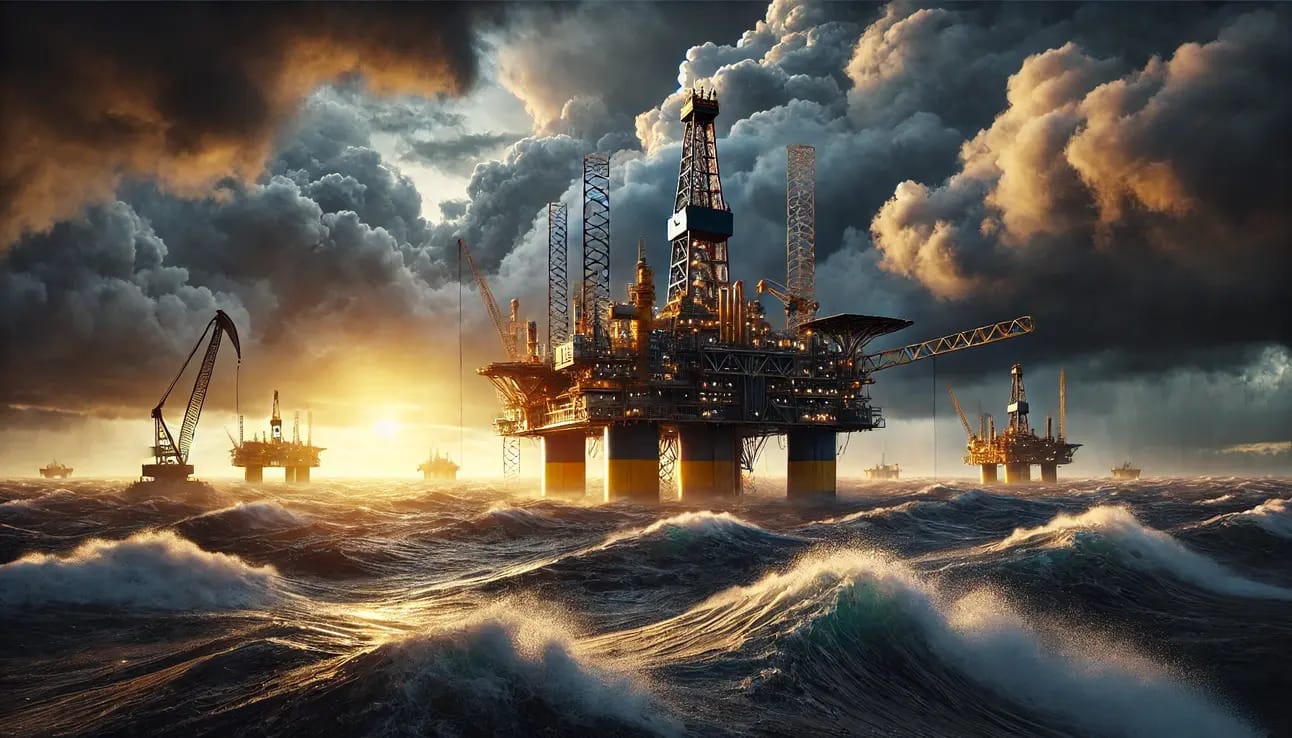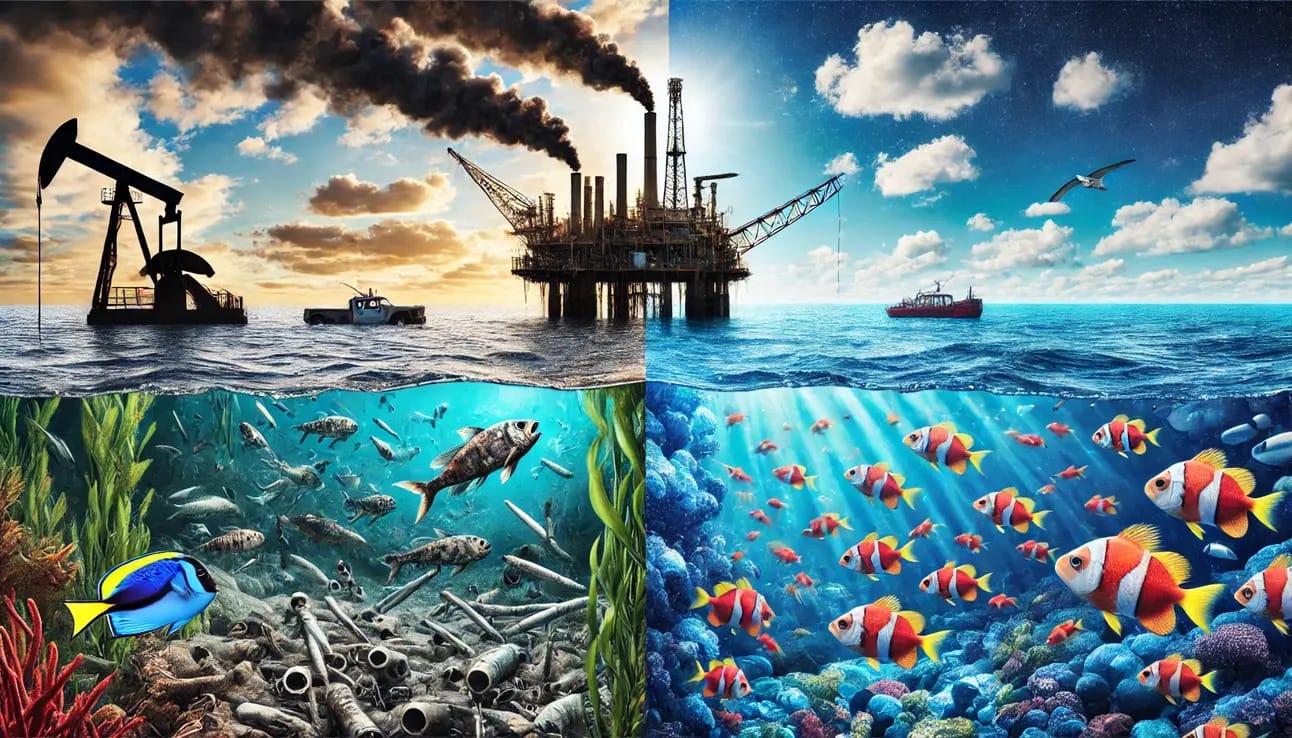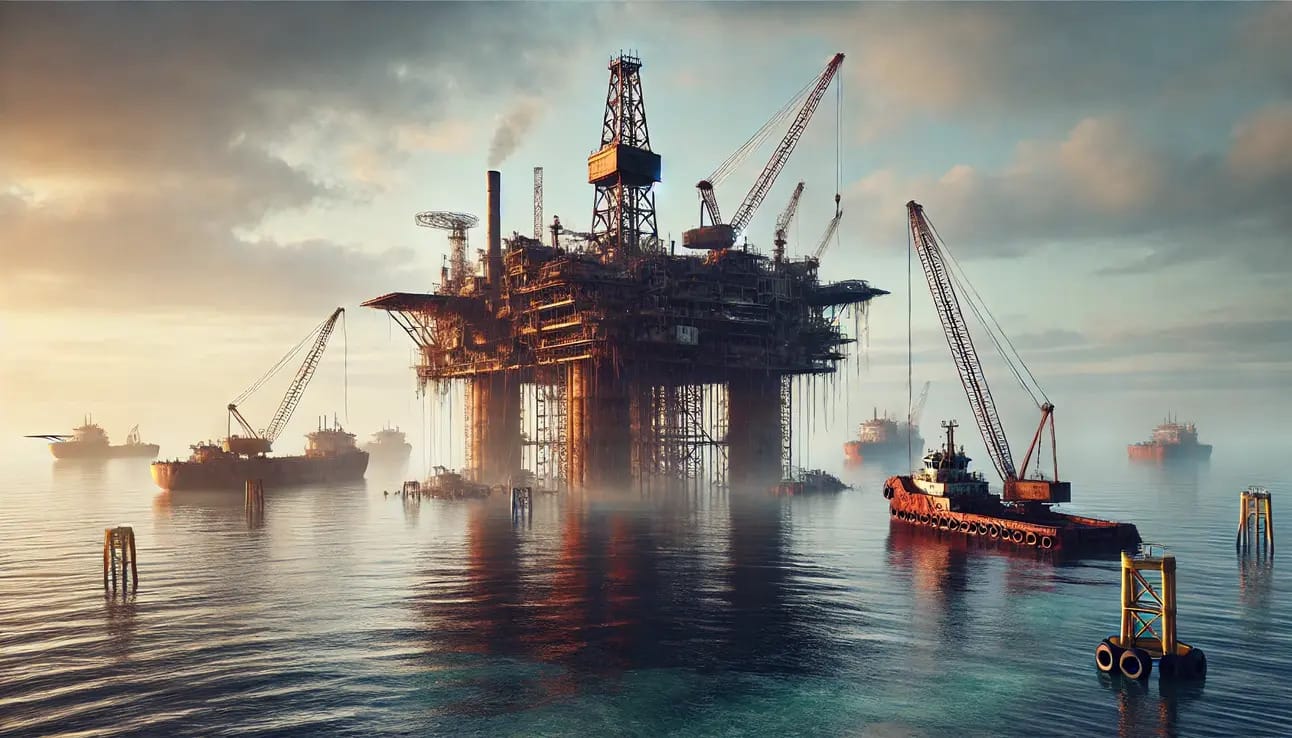- Green Glow
- Posts
- 🌱 Can America Ditch Offshore Drilling? What Biden’s Ban Signals for the Future 🚨🌊
🌱 Can America Ditch Offshore Drilling? What Biden’s Ban Signals for the Future 🚨🌊
Can America Ditch Offshore Drilling? Biden’s new ban protects 625 million acres of ocean from oil drilling, signaling a shift toward clean energy. But is the U.S. ready to phase out offshore oil? Read more about the challenges, environmental impact, and future of American energy policy.
President Joe Biden’s recent decision to ban new offshore drilling along most of the U.S. coastline is a significant step in America’s ongoing energy and environmental debate. With 625 million acres of ocean now protected from new oil and gas exploration, the move raises a critical question: Can the U.S. transition away from offshore drilling entirely? This article explores the implications of Biden’s ban, the challenges it faces, and what it signals about the future of American energy policy.
Table of Contents

Biden’s Offshore Drilling Ban: A Historic Decision
On Monday, President Biden announced an indefinite ban on new offshore oil and gas drilling along the Atlantic and Pacific coasts, the eastern Gulf of Mexico, and Alaska’s Bering Sea. Using the 1953 Outer Continental Shelf Lands Act, which allows presidents to withdraw unleased lands from drilling, Biden expanded protections beyond those set by his predecessors.
This decision comes at a time when climate concerns are mounting—2023 was the hottest year on record—and as the U.S. continues to wrestle with its energy priorities. While environmental advocates praise the move as a step toward sustainability, critics argue that it could increase reliance on foreign oil and raise energy prices.
Why Offshore Drilling Matters in the U.S. Energy Landscape
Offshore drilling has been a cornerstone of U.S. energy production for decades. The Gulf of Mexico alone produces about 15% of the nation’s crude oil and employs thousands in the industry. Oil companies argue that limiting offshore drilling could:
Increase dependence on foreign oil, potentially raising gas prices.
Impact jobs and local economies, particularly in states like Louisiana and Texas, where offshore drilling is a key industry.
Slow down U.S. energy production, at a time when global energy markets are volatile.
However, opponents of offshore drilling point out the environmental risks and long-term benefits of shifting to renewable energy sources.
Environmental Risks and the Push for Renewable Energy
The Deepwater Horizon disaster in 2010, which spilled 134 million gallons of oil into the Gulf of Mexico, remains a stark reminder of the dangers of offshore drilling. Beyond catastrophic spills, routine drilling operations can harm marine ecosystems, disrupt fisheries, and contribute to carbon emissions.
Biden’s ban aligns with the broader goal of reducing U.S. greenhouse gas emissions and transitioning to clean energy. The administration has heavily invested in offshore wind energy, with plans to develop large-scale wind farms off the East Coast. The question remains: Can these alternative energy sources fully replace offshore oil and gas?

Can the U.S. Fully Ditch Offshore Drilling?
While Biden’s ban is a major step, completely eliminating offshore drilling faces major obstacles:
Legal and Political Challenges: Future administrations, especially a potential second Trump presidency, could attempt to reverse Biden’s decision. However, since Biden used the 1953 law, overturning the ban may require congressional action.
Economic and Energy Security Concerns: The U.S. still relies on fossil fuels for transportation, manufacturing, and electricity generation. A sudden halt to offshore drilling without alternative energy solutions in place could disrupt energy markets.
Renewable Energy Development: For offshore drilling to become obsolete, the U.S. needs a robust and reliable clean energy infrastructure. Expanding offshore wind, solar, and battery storage is essential to meeting energy demands without relying on oil and gas.
What This Ban Signals for the Future
Biden’s ban sends a clear message: the U.S. is moving toward a clean energy future, but the transition will take time. While offshore drilling isn’t disappearing overnight, restrictions on new drilling suggest that fossil fuel reliance will continue to decline in the coming decades.
If renewable energy investments continue to grow and technological advancements make clean energy more affordable and efficient, America could eventually phase out offshore drilling. However, political and economic factors will determine how quickly this transition happens.

Conclusion
Biden’s offshore drilling ban is a bold move in the fight against climate change, but it doesn’t mark the end of offshore oil and gas production in the U.S. While the decision prioritizes environmental protection, the path to a future without offshore drilling depends on the country’s ability to scale up clean energy alternatives, navigate political opposition, and balance economic needs.
So, can America ditch offshore drilling? Not yet—but Biden’s ban signals that the shift is already underway.
FAQs
What does Biden’s offshore drilling ban include?
Biden’s ban prohibits new offshore oil and gas drilling along most of the U.S. coastline, including the Atlantic and Pacific coasts, the eastern Gulf of Mexico, and Alaska’s Bering Sea. It protects 625 million acres of ocean from future leasing.
Can Biden’s offshore drilling ban be reversed?
Since Biden used the 1953 Outer Continental Shelf Lands Act, reversing the ban would likely require congressional action. However, future administrations could challenge it or seek workarounds.
How does offshore drilling impact the U.S. economy?
Offshore drilling contributes significantly to U.S. oil production and provides jobs, especially in Gulf Coast states. Critics argue that restricting drilling could lead to higher energy prices and job losses in the oil industry.
What are the environmental risks of offshore drilling?
Offshore drilling can lead to catastrophic oil spills, habitat destruction, and water pollution. The 2010 Deepwater Horizon spill demonstrated the long-term damage oil spills can cause to marine ecosystems and coastal communities.
Can the U.S. completely phase out offshore drilling?
While Biden’s ban is a step toward reducing reliance on fossil fuels, offshore drilling remains a significant energy source. A complete phase-out would require major investments in renewable energy, energy storage, and infrastructure improvements.
You May Also Like
🌱 What Trump’s Return Means for U.S. and Global Climate Action 🌎⚡
🌱 Wildfire Devastation: How Los Angeles Entrepreneurs Are Rebuilding from Ashes 🔥 🏗️✨
🌱 From Donations to Debt: The Evolution of Climate Financing Post-COP29 🌍💸
🌱 What Jimmy Carter’s Environmental Legacy Teaches Us About Sustainability Today 🌞🌍
External Links
Follow Us:
X: https://www.x.com/greenglownews
Youtube: https://www.youtube.com/@greenglownews
Instagram: https://www.instagram.com/greenglownews
Sponsored Links